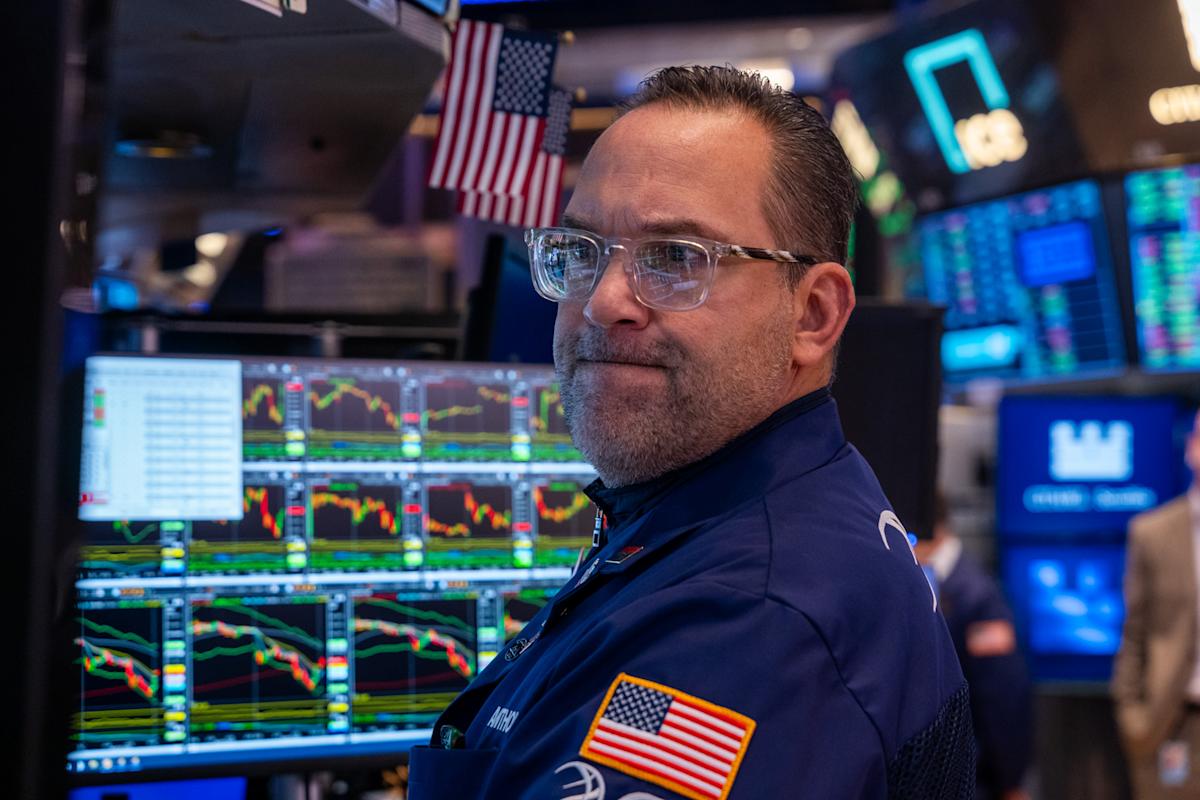Updated 2 min read
In This Article:
US stocks gained on Thursday, with Big Tech leading the way as investors digested mixed signals from President Trump and his top advisers on tariffs.
The Dow Jones Industrial Average (^DJI) rose above the flat line. The benchmark S&P 500 (^GSPC) gained 0.7%, while the tech-heavy Nasdaq Composite (^IXIC) rose 1.4%. The “Magnificent Seven” megacap stocks all gained.
DJI – Delayed Quote USD
As of 10:22:53 AM EDT. Market Open.
^DJI ^GSPC ^IXIC
The S&P 500 has rallied over 4% in the last two days, boosted in large part by tariff-talk optimism. On Wednesday, stocks rallied as the US floated slashing China tariffs, though the stock surge eased when Treasury Secretary Scott Bessent said there has been “no unilateral offer from the president to deescalate” the trade war with China.
Meanwhile on Thursday, China stood defiant as the US eased its rhetoric, demanding the US eliminate all tariffs and denying that any talks have taken place between the nations.
Read more: The latest on Trump’s tariffs
While Trump’s apparent eagerness to negotiate takes the spotlight, his approach to other key tariffs grew more muddled.
The Financial Times reported that the Trump administration is considering exempting automakers from the most punishing auto tariffs, yet Trump said from the Oval Office that a 25% tariff on cars imported from Canada could increase.
The White House also ordered a probe into truck imports, paving the way for tariffs on the sector.
In corporates, IBM (IBM) shares dropped 5% on Thursday after the company revealed 15 government contracts were impacted by cost cuts from the Trump administration. Chipotle (CMG) shares rose slightly after its first quarter earnings missed expectations and it lowered its 2025 forecast.
On Thursday, Wall Street’s attention will shift to Alphabet earnings. While investors don’t expect the company’s results to be impacted by Trump’s trade war yet, they’ll be watching for any warning signs of how tariffs could hit the business in the near future.
Intel is also reporting earnings after the bell on Thursday. The results will be the company’s first under the leadership of its new CEO, Lip-Bu Tan.
LIVE 17 updates
-
Nvidia leads Big Tech higher as ‘Magnificent 7’ stocks extend gains
Nvidia (NVDA) rose 2% Thursday morning, leading the “Magnificent Seven” tech stocks higher as the group climbed for a third day.
Other Big Tech names climbed as well. Tesla (TSLA), Microsoft (MSFT), and Google (GOOG) trailed closely behind Nvidia, rising nearly 2%. Meta (META) and Amazon (AMZN) rose more than 1%, while Apple (AAPL) climbed less than 1%.
The group extended its rally that began Tuesday as the Trump administration hinted at a potential deescalation of the US-China trade war. China has denied that it’s made any progress in trade talks with the US since being slapped with 145% “reciprocal tariffs” by Trump.
The Magnificent Seven stock gains added more than $840 billion to their cumulative market capitalizations between Monday’s close and the end of Wednesday’s trading session.
The rally comes amid a volatile year as Trump’s ever-changing trade policies rock the stock market, with tech stocks feeling the brunt of the impact. The Magnificent Seven stocks are all down year to date.
Meanwhile, Big Tech earnings season is underway. Google parent Alphabet is set to report earnings after the bell Thursday. Microsoft, Meta, Apple, and Amazon earnings are next week.
-
Resale market stalls as high mortgage rates sideline buyers
The resale housing market stalled in March during a critical selling season as high mortgage rates sidelined buyers, deepening affordability challenges.
Existing home sales declined nearly 6% in March to a seasonally adjusted annual rate of 4.02 million, according to the National Association of Realtors. This marked the steepest monthly decrease since November 2022. Economists polled by Bloomberg had expected sales to reach 4.15 million.
Sales remain down, with a 2.4% decrease from last year and a drop from 4.12 million in March 2024.
“Home buying and selling remained sluggish in March due to the affordability challenges associated with high mortgage rates,” NAR chief economist Lawrence Yun said in a press release. “Residential housing mobility, currently at historical lows, signals the troublesome possibility of less economic mobility for society.”
House hunters remain on the fence about buying a home as mortgage rates march toward 7%. Separate data shows applications to purchase a home fell for a second week to the lowest level since February, according to data from the Mortgage Bankers Association.
-
Netflix stock notches all-time high
Netflix stock just hit a new all-time high of above $1,070 a share.
The move comes after the company reported earnings last week that topped expectations and solidified the company’s position as a defensive player in an industry grappling with economic uncertainty tied to President Trump’s trade war, according to Wall Street analysts.
“Netflix [is] playing offense, while stock remains defensive,” JPMorgan analyst Doug Anmuth wrote in a client note published on Sunday, echoing recent industry comments that the platform remains the “cleanest story in internet.”
The stock’s resilience is a standout in the tech landscape as rising costs, regulatory pressures, tariff whiplash, and a potential slowdown in advertising revenue have weighed on shares of many Big Tech leaders this year.
During the earnings call, Netflix co-CEO Greg Peters said the company was closely monitoring consumer sentiment amid tariff-related uncertainty but had seen no significant changes in its business performance.
“We’re paying close attention clearly to the consumer sentiment and where the broader economy is moving,” Peters said. “But based on what we are seeing by actually operating the business right now, there’s nothing really significant to note.”
Read more about what Wall Street has said about Netflix here.
-

Corporate earnings are starting to look like a mess…
Four times a year, US companies give away more information about their business than they’d like.
For investors, this quarterly ritual is a chance to get an update on the state of America’s largest companies, the overall economy, and get a certain outline of where things are headed next.
But the earnings period is starting to look like it might fall way short of meeting these marks.
For one thing, companies are pulling guidance left and right because of uncertainty related to Trump’s tariffs. American Airlines (AAL) is just the latest. It’s an expected outcome, of course, because if you can’t feel good about internal forecasts, why would you offer investor-facing guidance? After all, guidance isn’t a required disclosure.
Another emerging trend, however, might be even more challenging for investors: demand (and profits) getting pulled forward.
In a note to clients on Thursday morning, Wamsi Mohan and the team at Bank of America lowered their price target on Apple stock by $10/share while raising their sales estimates for its most recent and current quarter “driven by some pull forward of demand” due to tariffs.
For the balance of the year, Mohan’s team cut these estimates “to adjust for higher costs of navigating a more complex supply chain and for delays in launching an AI enabled Siri.”
This indicates that the company is really facing headwinds on three fronts: consumer demand related to tariffs, supply chain issues related to tariffs, and strategic questions.
All businesses always face the third. That’s what business is: a rolling series of strategic decisions that are either working or not.
But the first two are where we’re finding the bulk of companies and analysts spending the bulk of their time. And neither the impact on consumer spending nor the impact on business investment from tariffs is easily quantifiable right now.
Making the most pressing economic question facing companies and their workers unanswerable, while the most persistent economic questions facing companies and their workers get put on the back burner.
-
Trump isn’t done criticizing Powell
-
Stocks mixed following 2-day rally as Trump tariffs stay in focus
US stocks were mixed on Thursday following a two-day rally as traders weighed the latest Trump administration tariff developments and China denied deal talks were taking place with Washington.
The Dow Jones Industrial Average (^DJI) fell 0.4%. The benchmark S&P 500 (^GSPC) rose above the flatline, while the tech-heavy Nasdaq Composite (^IXIC) gained 0.2%.
Stocks have rallied over the past two days in hopes that some sort of deal between the US with China will come to fruition, or tariffs on the country would be reduced substantially. On Thursday however China’s Ministry of Commerce indicated Beijing was not negotiating a deal with Washington.
The trade war is already impacting company outlooks. American Airlines (AAL) pulled its full-year guidance on Thursday, saying it intends to post it when the economic outlook becomes clearer.
Meanwhile PepsiCo cut its guidance. The beverage company now sees no earnings growth in 2025. It previously expected low-single-digit percentage growth.
-

Durable goods orders offer another sign of some industries front-running tariffs
An emerging theme in the US economy is the idea of businesses and consumers front-running tariffs by pulling forward spending to get ahead of price increases.
Thursday morning’s durable goods order release from the Census Bureau might be the best example yet.
Durable goods orders rose 9.2% in March from the previous month, blowing away forecasts for a 2% rise as one of the biggest increases in aircraft orders on record pushed the number above consensus.
Aircraft orders rose 190% in March, which Oliver Allen, senior US economist at Pantheon Macroeconomics, said was “likely driven in part by worries about tariffs.”
Excluding defense spending, durable goods orders rose 10.4%. In Allen’s view, however, the balance of Thursday’s report showed, “[the main measures of underlying orders were relatively weak in March.”
And with tariffs likely to further upset the ability for businesses to commit to new, large outlays, “Far weaker capital goods orders and equipment investment surely lie ahead, however, over the next few quarters.
“The rush of pre-tariff activity probably now will unwind sharply, policy uncertainty is so intense that many new investment projects will be paused or shelved, and capital goods exports to China will nosedive.”
-
Trump pushing markets around isn’t only about Trump
In markets, sentiment spurs action, Yahoo Finance’s Myles Udland wrote in today’s Morning Brief. And the current levels of pessimism owing to tariff-related uncertainty may be approaching a sentiment washout. Myles writes:
-
Consumer bellwether Procter & Gamble lowers profit forecast
Procter & Gamble (PG) stock fell 1% after the Tide detergent maker lowered its sales and profit forecast amid a pullback in consumer spending.
“We expect uncertainty to continue”, P&G CEO Jon Moeller told Yahoo Finance’s Brian Sozzi.
A P&G spokesperson said US shoppers slowed their spending in February and March, per Reuters, as President Trump’s tariffs raised recession concerns. The company did not disclose the extent of the impact it expects from tariffs.
Procter & Gamble now expects total net sales for 2025 to remain flat from last year, down from 2% to 4% growth. This, coupled with Pepsi’s (PEP) guidance cut, suggests signs of stress from consumer goods companies amid tariff-fueled uncertainty, though consumer staples are generally seen as safe havens during economic downturns.
-
American Airlines pulls full-year guidance
American Airlines (AAL) pulled its full-year guidance on Thursday, saying it intends to post it when the economic outlook becomes clearer.
“The company is withdrawing its full-year guidance at this time. American intends to provide a full-year update as the economic outlook becomes clearer,” the airline said in its quarterly results release.
The guidance pull from American comes after its peer Delta (DAL) did not affirm its full-year forecast earlier this month, citing headwinds from the economic uncertainty surrounding the trade war. Meanwhile, United (UAL) recently took the unusual step of issuing two profit scenarios.
On Thursday morning, American posted first quarter revenue of $12.6 billion versus expectations of $12.53 billion. The airline’s adjusted loss per share came in at $0.59 versus a loss of $0.69 expected by Wall Street.
-
Good morning. Here’s what’s happening today.
Economic data: Initial jobless claims (week ending April 19); Chicago Fed national activity index (March); Durable goods orders (March preliminary); Capital goods orders (March preliminary); Existing home sales (March); Kansas City Fed manufacturing activity
Earnings: Alphabet (GOOGL, GOOG), American Airlines (AAL), Freeport-McMoRan (FCX), Intel (INTC), Merck (MRK), Nasdaq (NDAQ), Nokia (NOK), PepsiCo (PEP), Skechers (SKX), Southwest Airlines (LUV), T-Mobile (TMUS), Union Pacific (UNP), Valero (VLO)
Here are some of the biggest stories you may have missed overnight and early this morning:
Trump pushing markets around isn’t only about Trump
Tariffs latest: China calls US trade negotiation claims ‘groundless’
Chinese customers are rejecting new jets due to tariffs
Why Tesla’s upcoming cheaper EV is going to look very familiar
American Airlines pulls 2025 outlook amid tariff uncertainty
PepsiCo cuts annual profit forecast amid trade war turmoil
Battered and bruised dollar has further to fall: Goldman
Jefferies: US stocks’ best days are behind, sees more losses ahead
-
PepsiCo normally doesn’t cut guidance
The market bears can add a rare earnings warning from PepsiCo (PEP) to their arsenal against the bulls.
Having covered PepsiCo for about 15 years, I can tell you it’s not the norm that they cut guidance. The company takes guidance super seriously, maybe too seriously.
Yet here we are in a trade war, and PepsiCo now sees no earnings growth in 2025. It previously expected low-single-digit percentage growth.
Couple this with the Chipotle (CMG) warning last night, and you get a picture of a consumer starting to retrench due to tariff-related economic concerns.
-
Chipotle drops after earnings miss highlights consumer pull back
Chipotle’s (CMG) stock dropped 3% on Thursday after its first quarter report missed expectations and it lowered its 2025 forecast.
Yahoo Finance’s senior reporter Brooke DiPalma looks into how the burrito maker has performed in a slowing economy:
-
IBM stock falls as 15 contracts hit by DOGE cost cuts
IBM (IBM) shares fell over 7% on Thursday after the company revealed that 15 of its government contracts were canceled under a cost-cutting drive by the Trump administration.
Reuters reports:
The $100 million setback overshadowed its better-than-expected first-quarter results and an upbeat revenue forecast, adding to investor uncertainty despite IBM’s efforts to boost transparency and maintain growth targets.
The federal consulting businesses of Big Blue’s rivals, such as Accenture, have also taken a hit from belt-tightening efforts by the US administration and its Department of Government Efficiency.
The impacted contracts amounted to about $100 million, which was less than 1% of the order backlog in IBM’s consulting unit, finance chief James Kavanaugh told Reuters on Wednesday.
-
Gold rebounds after biggest drop this year as dip-buyers step in
Gold (GC=F) bounced back after its biggest single-day drop of the year, as traders weighed conflicting messages from the US on China tariffs.
Bloomberg News reports:
-
Dollar falters in bounce back from tariff downward dive
The dollar (DX=F) pulled back from a recent rebound late Thursday as President Donald Trump walked back his unsubstantiated threats to remove Federal Reserve chair Jerome Powell from office.
Reuters reports:
After dipping below 140 yen on Tuesday, the dollar has rebounded off major chart support and was last at 143.25 yen on Thursday.
It caught an extra boost when Treasury Secretary Scott Bessent said the U.S. did not have a specific currency target in mind, ahead of talks with his Japanese counterpart. Bessent has also said the current de-facto embargo on U.S.-China trade was unsustainable, while cautioning that the U.S. would not move first in lowering its levies of more than 100% on Chinese goods.
The dollar has recovered from a three-and-a-half-year low of $1.1572 per euro, but encountered a little selling in the Asia morning to steady around $1.1338.
-
Trending tickers in after-hours trading
Chipotle (CMG)
After a rocky earnings report announcing that Chipotle missed the mark while lowering expectations for the year, Chipotle stock sank in after-hours trading. The fast food giant reported earnings of 29 cents per share and revenue of $2.88 billion falling short of the $2.94 billion analysts were looking for. The company’s stock dropped by 4% on futures opening before pulling back to a 2.3% loss in value.
International Business Machine (IBM)
IBM shares spiked before falling over 6.7% in extended trading Thursday, despite the fact that the tech giant posted better-than-expected Q1 results. The company reported adjusted earnings of $1.60 per share on $14.54 billion in revenue, topping Wall Street estimates of $1.40 and $14.40 billion.
News that DOGE price saving measures led to 15 contracts between IBM and the US government being cut drove stock cost down.
Texas Instruments (TXN)
Shares of Texas Instruments surged 4.7% in after-hours trading Tuesday after the chipmaker delivered a strong first-quarter beat that reassured investors. The company posted earnings of $1.28 per share on revenue of $4.07 billion, outpacing Wall Street forecasts of $1.07 per share and $3.91 billion,



















